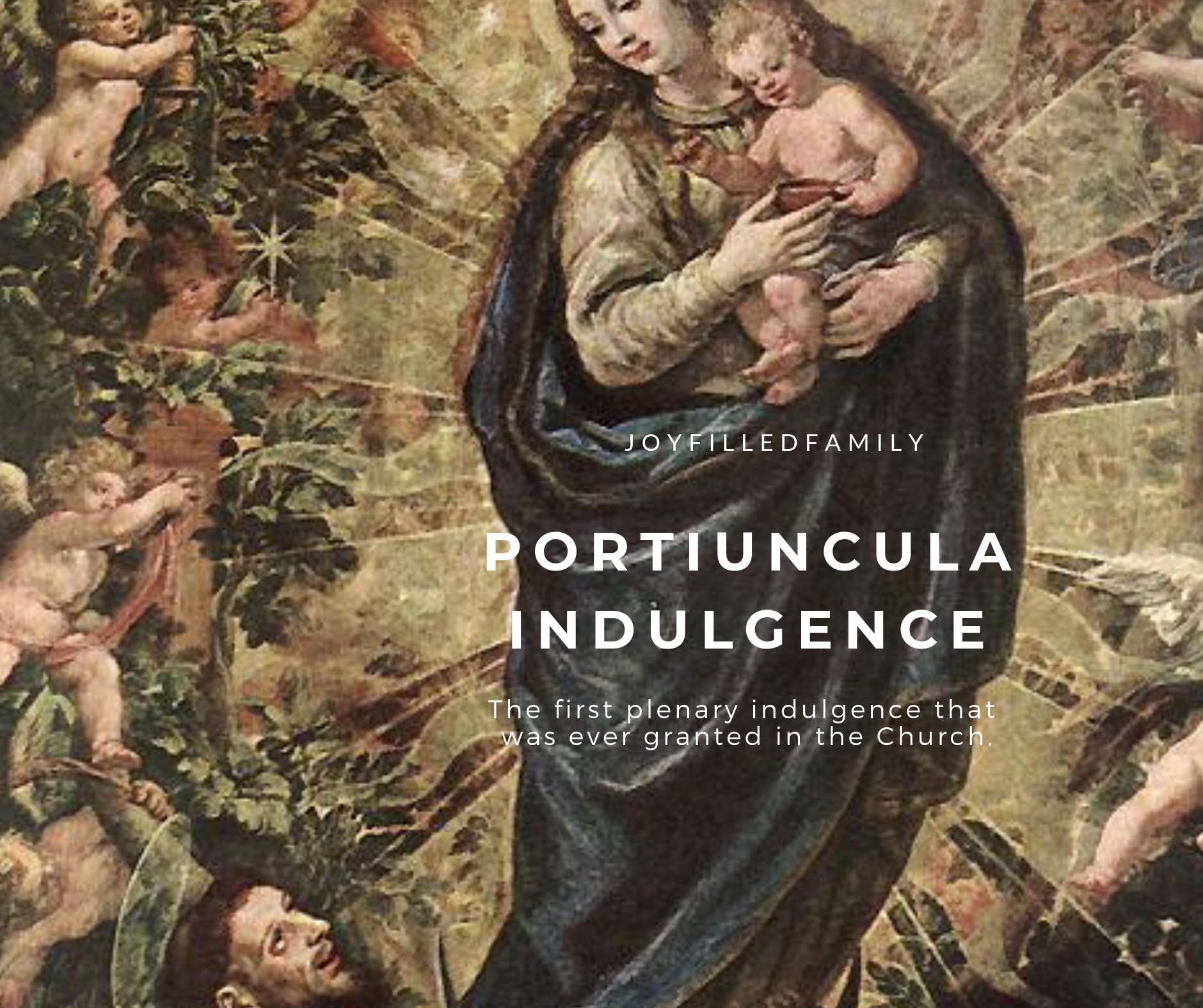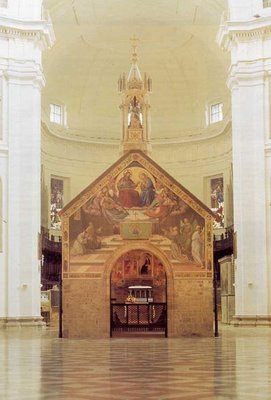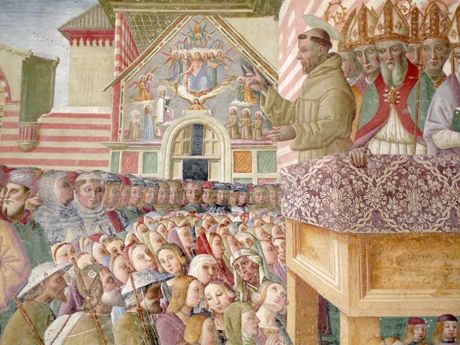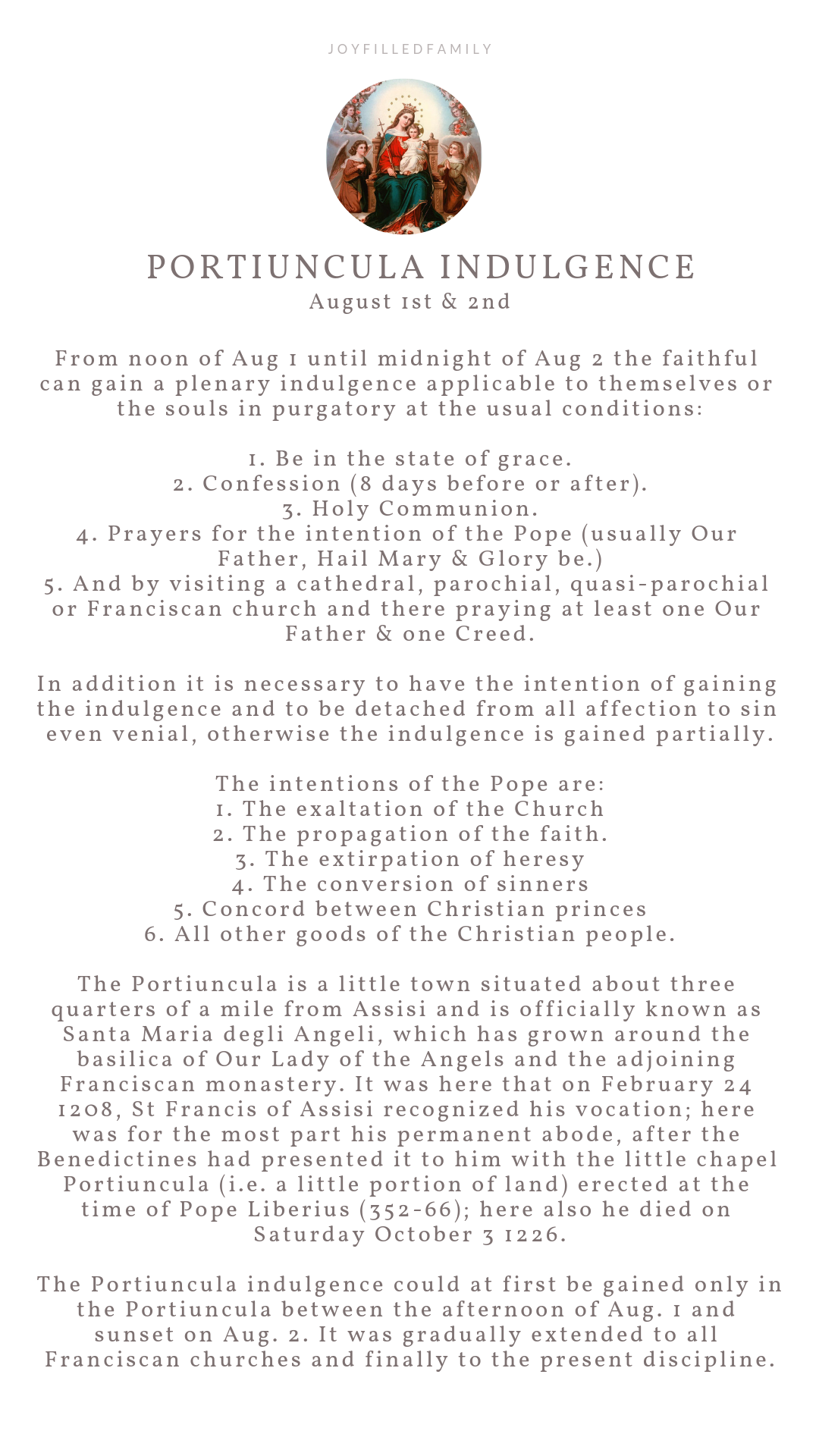The same that Christ says to the man sick of the palsy, the priest says to every contrite sinner in the confessional, and thus remits the crime or the guilt of his sins, and the eternal punishment, by virtue of the authority given him by God. But since sins not only bring with them guilt and eternal punishment, but also temporal and indeed spiritual or supernatural punishment, such as, painful conditions of the soul, as well in this world as in purgatory, and natural ones, as: poverty, disease, all sorts of adversities and accidents, we should endeavor to liberate ourselves from them by means of indulgences. – Fr. Leonard Goffine

The following is an excerpt from Major Life of St. Francis by St. Bonaventure
” The Portiuncula was an old church dedicated to the Virgin Mother of God which was abandoned . Francis had great devotion to the Queen of the world and when he saw that the church was deserted, he began to live there constantly in order to repair it. He heard that the Angels often visited it, so that it was called Saint Mary of the Angels, and he decided to stay there permanently out of reverence for the angels and love for the Mother of Christ.
He loved this spot more than any other in the world. It was here he began his religious life in a very small way; it is here he came to a happy end. When he was dying, he commended this spot above all others to the friars, because it was most dear to the Blessed Virgin.
This was the place where Saint Francis founded his Order by divine inspiration and it was divine providence which led him to repair three churches before he founded the Order and began to preach the Gospel.
This meant that he progressed from material things to more spiritual achievements, from lesser to greater, in due order, and it gave a prophetic indication of what he would accomplish later.
As he was living there by the church of Our Lady, Francis prayed to her who had conceived the Word, full of grace and truth, begging her insistently and with tears to become his advocate. Then he was granted the true spirit of the Gospel by the intercession of the Mother of mercy and he brought it to fruition.
He embraced the Mother of Our Lord Jesus with indescribable love because, as he said, it was she who made the Lord of majesty our brother, and through her we found mercy. After Christ, he put all his trust in her and took her as his patroness for himself and his friars.”

Today the chapel of Portiuncula is situated inside the Basilica of Saint Mary of the Angels roughly 5 km from Assisi, Italy.
“The Portiuncula indulgence is the first plenary indulgence that was ever granted in the Church. There were indeed indulgences at all times, but they were only partial, and only a partial remission of the temporal punishments could be obtained by them. But, as already remarked, he who gains the Portiuncula indulgence is freed from all temporal punishments and becomes as pure as after holy baptism. This was also the reason why Pope Honorius was astonished when St. Francis petitioned for the confirmation of this indulgence, for such an indulgence, up to that time, had been entirely unknown. It was only after he had come to the conviction that Jesus Christ himself wished it, that he granted the petition of the saint and confirmed the indulgence” (Source)

PORTIUNCULA INDULGENCE
August 1st & 2nd
From noon of Aug 1 until midnight of Aug 2 the faithful can gain a plenary indulgence applicable to themselves or the souls in purgatory at the usual conditions:
1. Be in the state of grace.
2. Confession (8 days before or after).
3. Holy Communion.
4. Prayers for the intention of the Pope (usually Our Father, Hail Mary & Glory be.)
5. And by visiting a cathedral, parochial, quasi-parochial or Franciscan church and there praying at least one Our Father & one Creed.
In addition it is necessary to have the intention of gaining the indulgence and to be detached from all affection to sin even venial, otherwise the indulgence is gained partially.
The intentions of the Pope are:
1. The exaltation of the Church
2. The propagation of the faith.
3. The extirpation of heresy
4. The conversion of sinners
5. Concord between Christian princes
6. All other goods of the Christian people.
The Portiuncula is a little town situated about three quarters of a mile from Assisi and is officially known as Santa Maria degli Angeli, which has grown around the basilica of Our Lady of the Angels and the adjoining Franciscan monastery. It was here that on February 24 1208, St Francis of Assisi recognized his vocation; here was for the most part his permanent abode, after the Benedictines had presented it to him with the little chapel Portiuncula (i.e. a little portion of land) erected at the time of Pope Liberius (352-66); here also he died on Saturday October 3 1226.
The Portiuncula indulgence could at first be gained only in the Portiuncula between the afternoon of Aug. 1 and sunset on Aug. 2. It was gradually extended to all Franciscan churches and finally to the present discipline.
Since the reform of Paul VI we can only gain one plenary indulgence per day.
